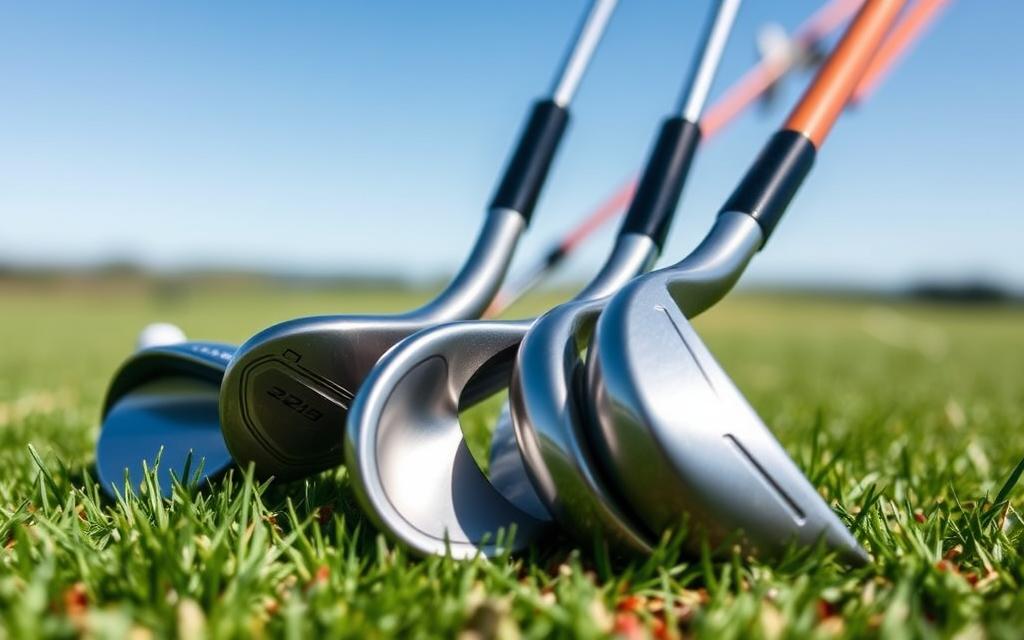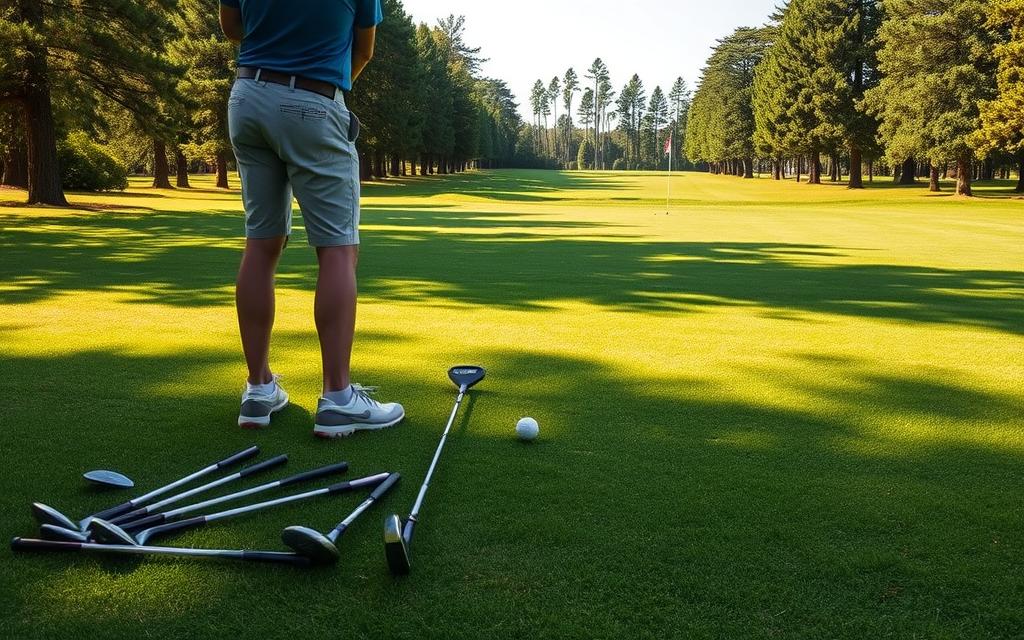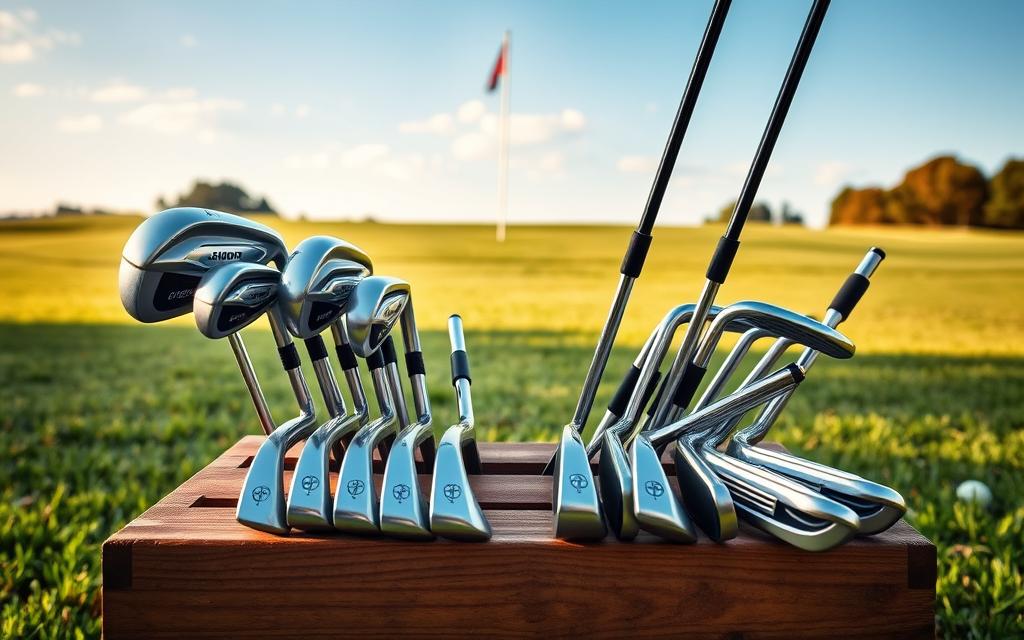Golf is all about knowing your yardages and picking the right club. The 100-yard shot is key. But, what club do most golfers use from 100 yards? It might be more than you think.
This guide will dive into club selection for 100-yard shots. We’ll look at the most common clubs used and share tips for choosing the right one. Get ready to improve your approach shots and boost your golf game.
Key Takeaways
- Understanding the factors that influence your 100-yard shot distance is key for club selection
- Knowing the most common clubs used for 100-yard shots helps you make a smart choice
- Consider your skill level and the course conditions when picking a club
- Practice your 100-yard shots to get better and more accurate
- Adjust your club choice for different weather and terrain to get better results
Understanding Your Distances with Different Clubs
As a golfer, knowing your distances with different clubs is key for 100-yard shots and controlling distance. Your swing speed, the club loft, and ball compression all affect how far you can hit. Learning about these can help you pick the right club for your game.
Importance of Knowing Your Yardages
Knowing your exact yardages for each club is vital for controlling distance and making accurate shots. This lets you choose the right club for any distance. It helps you hit your target and avoid losing distance.
Factors Influencing Distance
- Swing Speed: Faster swings mean the ball goes farther. Your fitness, strength, and swing style all affect your speed.
- Club Loft: Lofted clubs like pitching wedges hit shorter shots. Drivers, with lower loft, hit the ball farther.
- Ball Compression: The golf ball’s compression rating also matters. Balls with higher ratings travel farther than those with lower ratings.
| Club | Average Distance |
|---|---|
| Driver | 230-260 yards |
| 3-wood | 210-240 yards |
| 5-iron | 180-200 yards |
| 7-iron | 150-170 yards |
| Pitching Wedge | 110-130 yards |
“Understanding your distances with different clubs is the foundation for consistent, accurate shot-making on the golf course.”
By studying how different factors affect your 100-yard shots, you can improve your game. This knowledge helps you choose the best club for each shot.
Most Common Clubs for 100-Yard Shots
Golfers often use a few key clubs for shots around 100 yards. These scoring clubs include the pitching wedge, gap wedge, and sand wedge. They help you play the short game well.
Pitching Wedge
The pitching wedge is great for 100-yard shots. It has a lot of loft and helps control distance. This makes it perfect for soft landings on the green.
It’s also good for many short game tasks. This includes chipping and shots from bunkers.
Gap Wedge
The gap wedge is called the “in-between” wedge. It’s between the pitching and sand wedges. It’s for shots between 90-110 yards.
This club helps you get closer to the green. It’s part of your scoring clubs setup.
Sand Wedge
The sand wedge is mainly for bunker shots. But it’s also good for 100-yard shots. It has a lot of loft, so the ball goes high and lands softly.
This is great for shots needing a high trajectory. It gives you more control over the ball’s fall.
Knowing what each scoring club does helps you choose the right one. This way, you can play your 100-yard shots better, based on the course’s needs.

How to Choose the Right Club for Your Game
Choosing the right golf club for 100-yard shots is key to your game. You need to know your skill level and the course conditions. This helps you pick the best club for better shots.
Assessing Your Skill Level
First, check your golf skills. Are you new, in between, or very good? Your skill level helps pick the right club for you. Beginners might do well with a pitching wedge or gap wedge. More skilled players might choose a sand wedge for better control.
Considering Course Conditions
Course conditions also matter when picking a club. Things like terrain, weather, and layout affect your choice. For example, a firm, dry fairway might need a club with more loft. But a wet, soft course might need less loft.
| Skill Level | Recommended Club | Typical Yardage |
|---|---|---|
| Beginner | Pitching Wedge | 90-110 yards |
| Intermediate | Gap Wedge | 100-120 yards |
| Advanced | Sand Wedge | 110-130 yards |
Think about your skill and the course when choosing a club for 100-yard shots. This careful choice helps you play better. It’s all about golf club selection, golf strategy, and approach shots.
Tips for Hitting 100-Yard Shots Accurately
Learning to hit 100-yard shots is key for any golfer. It helps improve your short game and control over distance. Focus on your grip, stance, and swing to hit these shots accurately. Here are some tips to help you master the 100-yard challenge.
Focus on Your Grip and Stance
A solid grip and balanced stance are essential for 100-yard shots. Your grip should be firm but relaxed, with hands in the right spot. Stand wider than shoulder-width, with weight evenly on both feet.
Avoid too much tension or swaying. It can mess up your swing and send the ball off course.
Perfecting Your Swing Technique
For consistent 100-yard shots, focus on your swing. Keep your swing smooth and controlled. Aim for a shallow, descending club path for clean contact.
Stay away from wrist hinge or quick, jerky movements. They can cause the ball to fly off-target or not far enough.
- Maintain a Balanced Finish: Complete your swing with a well-balanced and stable finish, ensuring your body is aligned with your target line.
- Practice Tempo and Rhythm: Develop a consistent rhythm and tempo to create a repeatable swing that delivers consistent distance and accuracy.
- Visualize the Shot: Before each swing, take a moment to visualize the perfect trajectory and landing spot for your 100-yard shot.
Mastering grip, stance, and swing will help you hit 100-yard shots accurately. It will also boost your distance control and short game skills.

Adjusting for Different Playing Conditions
Golf is more than just clubs and swing. It’s about adapting to the course’s changes. For 100-yard shots, knowing how to adjust for wind and terrain is key. This helps keep your shots accurate and on target.
Conquering the Wind
Wind can change how your shots fly. To fight the wind, pick the right club and swing. For shots into the wind, use a club that flies low, like a hybrid or long iron.
For shots downwind, choose a club that flies high, like a wedge. This helps counteract the extra distance the wind adds.
Navigating Terrain Variations
The course’s terrain affects your shots too. From an elevated lie, the ball goes farther. So, pick a club with less loft.
Downhill, the ball goes shorter. You’ll need a club with more loft to reach the green.
Knowing how wind and terrain affect your game helps. It lets you adjust and improve your scores.
“Adapting your club selection and swing to the playing conditions is a key skill. Mastering it can greatly improve your 100-yard shots.”
Practicing Your 100-Yard Shot
Being good from 100 yards is key for a great short game. To get better, do specific drills and exercises. These help build muscle memory and improve your club choice.
Drills for Consistency
Start by doing a series of 100-yard shots. Note how well you do each time. This shows you where you need to get better and tracks your progress.
Do drills that work on your grip, stance, and swing. Make sure your motion is the same every time. This helps you hit the ball accurately and reliably.
Tracking Your Progress
Keep track of how you do with your 100-yard shots. Write down the club you use, how the ball flies, where it lands, and how consistent you are. This info helps you fine-tune your club choice and technique.
Check your progress often and change your training if needed. This keeps you on track to improve.


